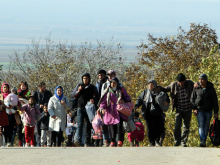All News on Social Issues in Croatia
HDZ wins most seats, cannot form government alone
The Croatian Election Commission has announced that a pre-election coalition led by the opposition HDZ party had won 59 seats in the country's parliament.
According to this, the ruling SDP party and their coalition won 56, while the regional party Most has 19 seats. The SDSS party, representing Serbs in Croatia, has won three seats, as has the IDS-PGS-RI coalition.
Conservative Opposition Declares Victory in Croatia's General Elections
The opposition conservative party, Croatian Democratic Union (HDZ), claimed victory in the parliamentary elections, which were held in the country on Sunday.
However HDZ will face challenges in forming a government as partial results show that the party is set to win about 60 seats, while the ruling alliance led by the Social Democrats is expected to have 50 MPs.
Merkel: Danger of war in Balkans if borders are closed
Merkel: Danger of war in Balkans if borders are closed
German Chancellor Angela Merkel has warned of "the danger of armed conflicts in the Balkans" in the event Germany closes its border with Austria.
There are already tensions in the Western Balkan countries, said Merkel, and added she "did not want military conflicts to occur there."
Merkel Warns Closing Borders Could Cause 'Military Conflict'
German Chancellor Angela Merkel has said that a move by her country to close the border with Austria might cause "military confrontation".
Germany will help all people fleeing war and persecution, but considers it just as send back people "who have come for economic reasons and do not need protection," Der Spiegel quotes her as saying.
Serbian, Croatian ministers "agree on some concrete steps"
Interior ministers of Serbia and Croatia Nebojsa Stefanovic and Ranko Ostojic met on Friday and announced that "some concrete steps have been agreed."
They said Croatian trains will in the future pick up refugees in Sid, on the Serbian side of the border, and take them to a reception center in Slavonski Brod, Croatia.
Europe's refugee saga
The European Union has been struggling to cope with the steady influx of people fleeing from turmoil, conflicts and harsh conditions in the Middle East, Africa and Asia for years. But the matters came to a tipping point after mainly Syrian and Afghan refugees pushed their way onto the EU over the summer amid several drowning incidents in the Mediterranean Sea.














